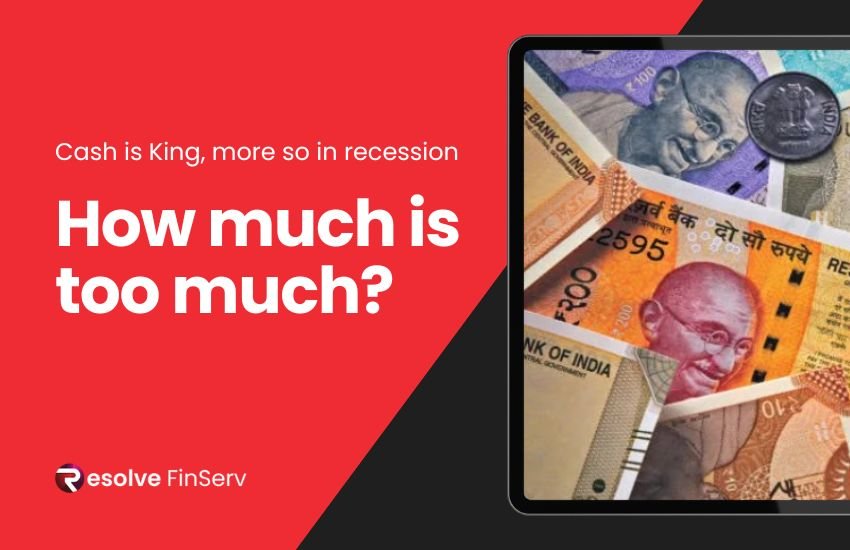How much is too much?

“There is really only one way to address cash flow crunches, and it’s planning so you can prevent them in advance.”
– Elaine Pofeldt
Cash always has a place in portfolio to tide over any emergency that may crop up unexpectedly. And everybody agrees that we should keep some cash. But how much is the question. Don’t worry you will find the answer by end of this post.
Why to keep cash?
There are two reasons to hold the CASH:
1)To Cover upcoming spending
2)Financial emergency.
Suppose you plan to make a house down payment in the next five years or you’re five years from making your teenager’s first college tuition payment. You don’t want to see this money devoured by a stock or bond market decline, so you probably shouldn’t own anything more adventurous than a high-quality short-term bond fund or Fixed Deposit in a Bank.
Even a short-term bond fund could suffer a modest loss, so you might favor a high-yield savings account or a low-cost money market fund once you’re within 18 or 24 months of spending the money.
Meanwhile, you may need to tap your emergency fund at short notice, so you should probably stash those rupees in the same sort of investments—savings accounts, money market funds and short-term bond funds.
How much rainy-day money should you have?
One rule of thumb says your emergency fund should equal three-to-six months of living expenses. That’s potentially a huge sum for some people.
Could you hold less?
The biggest financial emergency is losing your job. Ponder how long it might take you to find another job, how much you’d need to cover costs in the meantime and how much money is readily available to you.
For instance, you might hold less than the full six months of living expenses if your job is secure, if it would be easy to find a new job or if your spouse also works.

Join the Resolute
Make better financial decisions
- Stay Updated
- Grow Your Knowledge
- Make Confident Choices
How can I raise the money in case of emergency?
You might hold a smaller emergency reserve if you have easy access to borrowed money thanks to, say, a loan against property. Same if you’ve funded a Employee Provident Fund. EPF can be partially or completely withdrawn. Complete withdrawal is allowed when an individual retires or if he/she remains unemployed for more than 2 months. Whereas, partial EPF withdrawal is allowed under certain circumstances including medical purposes, marriage, home loan repayment, etc. Withdrawal of EPF after 5 years of continuous service attracts No TDS. Further, the individual need not offer the same in the return of income as such withdrawal is exempt from tax.
What if you have substantial savings in your taxable account—far more than you could conceivably need for a major home repair or a long period of unemployment? You might take more risk, stashing some of your emergency money in intermediate-term bonds and perhaps even buying stock mutual funds. Think of it like a high deductible on an insurance policy: Yes, if financial markets slide, your taxable account would take a hit—but if you have more than enough to cover a financial emergency, you should still be in decent shape.
Further to note that if you save more in saving accounts with Bank,it may attract income tax. Under 80TTA of the Income Tax Act, interest up to Rs 10,000 earned from all savings bank accounts is not taxable. This is valid for co-operative banks, post offices or savings bank accounts. If the interest earned from all these sources is more than Rs 10,000, then the extra amount become taxable as per your present tax slab.
“Money is a terrible master but an excellent servant.”
— P.T. Barnum.

